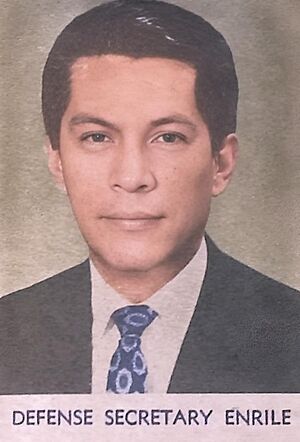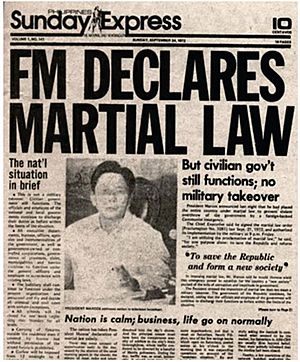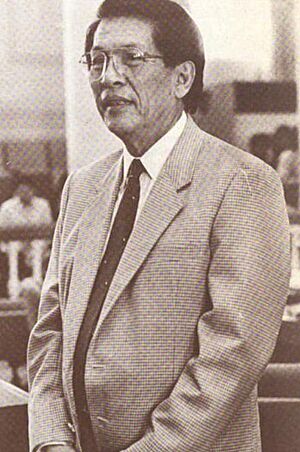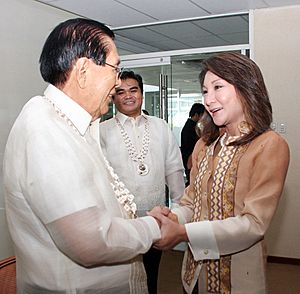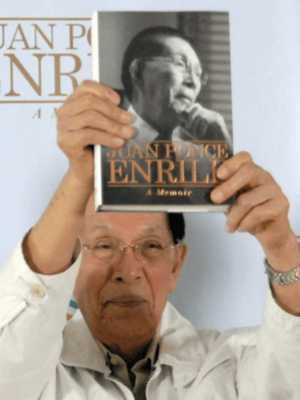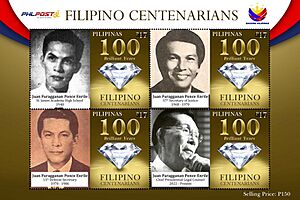Juan Ponce Enrile facts for kids
Quick facts for kids
Juan Ponce Enrile
|
|
|---|---|
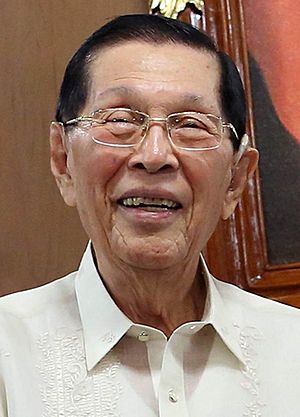
Enrile in 2017
|
|
| Chief Presidential Legal Counsel | |
| In office June 30, 2022 – November 13, 2025 |
|
| President | Bongbong Marcos |
| Preceded by | Jesus Melchor Quitain |
| 26th President of the Senate of the Philippines | |
| In office November 17, 2008 – June 5, 2013 |
|
| Preceded by | Manny Villar |
| Succeeded by | Jinggoy Estrada (Acting) |
| Senate Minority Leader | |
| In office August 24, 2015 – June 30, 2016 |
|
| Preceded by | Tito Sotto (Acting) |
| Succeeded by | Ralph Recto |
| In office July 22, 2013 – July 28, 2014 |
|
| Preceded by | Alan Peter Cayetano |
| Succeeded by | Tito Sotto (Acting) |
| In office July 27, 1987 – January 18, 1992 |
|
| Preceded by | Re-established Title last held by Gerardo Roxas |
| Succeeded by | Wigberto Tañada |
| Senator of the Philippines | |
| In office June 30, 2004 – June 30, 2016 |
|
| In office June 30, 1995 – June 30, 2001 |
|
| In office August 15, 1987 – June 30, 1992 |
|
| Member of the House of Representatives from Cagayan's 1st district | |
| In office June 30, 1992 – June 30, 1995 |
|
| Preceded by | Domingo A. Tuzon |
| Succeeded by | Patricio T. Antonio |
| Member of the Regular Batasang Pambansa from Cagayan | |
| In office June 30, 1984 – March 25, 1986 |
|
| Member of the Interim Batasang Pambansa from Region II | |
| In office June 12, 1978 – June 5, 1984 |
|
| 15th Minister of National Defense | |
| In office January 4, 1972 – November 23, 1986 |
|
| President | Ferdinand Marcos Corazon Aquino |
| Preceded by | Ferdinand Marcos |
| Succeeded by | Rafael Ileto |
| In office February 9, 1970 – August 27, 1971 |
|
| President | Ferdinand Marcos |
| Preceded by | Ernesto Mata |
| Succeeded by | Ferdinand Marcos |
| 36th Secretary of Justice | |
| In office December 17, 1968 – February 7, 1970 |
|
| President | Ferdinand Marcos |
| Preceded by | Claudio Teehankee Sr. |
| Succeeded by | Felix Makasiar |
| Undersecretary for Finance | |
| In office January 1, 1966 – December 17, 1968 |
|
| President | Ferdinand Marcos |
| Commissioner of the Bureau of Customs | |
| In office 1966–1968 |
|
| President | Ferdinand Marcos |
| Preceded by | Jacinto T. Gavino |
| Succeeded by | Rolando G. Geotina |
| Personal details | |
| Born |
Juan Valentin Furagganan
February 14, 1924 Gonzaga, Cagayan, Philippine Islands |
| Died | November 13, 2025 (aged 101) |
| Political party | PMP (2004–2025) |
| Other political affiliations |
LDP (2001–2004) Independent (1995–2001) KBL (1978–1987) Nacionalista (1965–1978; 1987–1995) |
| Spouse |
Cristina Castañer
(m. 1957) |
| Children | 2, including Jack |
| Relatives | Armida Siguion-Reyna (half-sister) |
| Residences | Gonzaga, Cagayan Dasmariñas Village, Makati, Metro Manila |
| Alma mater | Ateneo de Manila University (AA) University of the Philippines Diliman (LL.B) Harvard University (LL.M) |
| Occupation | Politician |
| Profession | Lawyer Ponce Enrile, Reyes & Manalastas (1983–2020) |
Juan Valentin Furagganan Ponce Enrile Sr., CLH (born Juan Valentin Furagganan; February 14, 1924 – November 13, 2025), also known as JPE, was a Filipino politician and lawyer. He served as the 26th President of the Senate of the Philippines from 2008 to 2013. Enrile had one of the longest careers in Philippine politics and lived to be 101 years old.
He was known for his important role during the administration of President Ferdinand Marcos. He was also involved in a significant event that contributed to the People Power Revolution in 1986. This revolution led to President Marcos leaving office. After 1986, Enrile continued his work in the Philippine legislature. He served four terms as a senator, totaling over 22 years. In 2022, at the age of 98, he returned to government as the Chief Presidential Legal Counsel for President Bongbong Marcos. He served in this role until his passing on November 13, 2025.
Contents
A Long and Important Career
Early Life and Education
Growing Up in Cagayan
Juan Valentin Furagganan was born on February 14, 1924, in Gonzaga, Cagayan. His mother was Petra Furagganan. His father was Alfonso Ponce Enrile, a lawyer and politician. Alfonso Ponce Enrile was already married at the time.
Records from the Philippine Independent Church in Cagayan suggest he was born on June 22, 1922. This information was shared by his son, Jack, in 2025. As a young man, he reunited with his father in Manila. He then took his secondary education at Saint James Academy in Malabon, Rizal. His father legally changed his name to Juan Ponce Enrile. He was baptized into the Aglipayan church and later converted to Roman Catholicism at age 20.
College and Law School
In 1949, he graduated with an Associate of Arts degree from the Ateneo de Manila. He then attended the University of the Philippines College of Law. He earned a Bachelor of Laws degree from there. During law school, he joined the Sigma Rho fraternity. He also became a member of the Pi Gamma Mu and Phi Kappa Phi honor societies.
He scored very well in the 1953 bar examinations. He then studied at Harvard Law School, earning a Master of Laws degree. He specialized in international tax law. He taught law and worked at his father's law firm. In 1964, he began handling the personal legal matters for then-Senator Ferdinand Marcos. After Marcos became president in 1965, Enrile became a close advisor.
Serving in the Government
Before Martial Law
Enrile, like Ferdinand Marcos, came from the northern Philippines. This region was a key area for Marcos to find political and military leaders. Enrile was with Marcos from his election in 1965.
From 1966 to 1968, he served as Undersecretary of the Department of Finance. He also worked as Acting Insurance Commissioner and Commissioner of the Bureau of Customs. From 1968 to 1970, he was the Secretary of Justice. Marcos appointed Enrile as his Secretary of National Defense on February 9, 1970. He held this position until August 27, 1971. He was re-appointed Defense Secretary by Marcos in 1972.
During Martial Law
Enrile was one of Marcos's most trusted allies. He officially served as the martial law administrator. This meant he was in charge of all armed forces during that time. Enrile was involved in the planning for the declaration of martial law. In his memoir, Enrile shared that Marcos asked him to study the 1935 Constitution. Marcos wanted to understand the President's powers as Commander-in-Chief.
In January 1970, Enrile submitted a report about martial law to Marcos. Marcos then asked Enrile to prepare all necessary documents for its implementation. By September 23, 1972, Marcos announced that he had placed the country under martial law. This was done through Proclamation 1081.
The September 1972 Incident
One reason Marcos gave for declaring martial law was concerns about public safety. He mentioned an incident on September 22, 1972, involving an alleged attack on Enrile's car. Many people at the time questioned if this attack truly happened.
In 1986, Lieutenant General Fidel Ramos and Enrile stated that the incident was presented in a way that supported the declaration of martial law. This statement was widely covered by media. Later, in his book, Enrile offered a different perspective. He said that rumors about the incident being staged were spread by his political opponents.
Key Roles During Martial Law
Enrile remained a loyal ally to Marcos. In 1973, his title became Defense Minister. He focused on defense policies and addressing social unrest. With other civilian institutions closed, the military became a very important part of the government.
Enrile was also appointed to oversee logging in the Philippines during martial law. He issued certificates to logging companies. During this time, there were concerns about the country's forest cover shrinking significantly. Enrile also held leadership roles in the Philippine Coconut Authority. He worked with Danding Cojuangco in the copra industry. They oversaw the controversial Coco Levy Fund, which faced questions about its use. There were also discussions about how some government funds were used in connection with these companies.
Changes in Influence
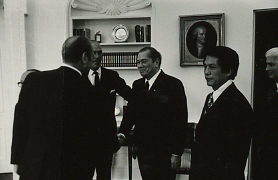
As the Marcos administration continued, Enrile's influence began to change. By the 1980s, Marcos started to make decisions that bypassed Enrile's authority. Enrile then began to connect with other military members who were unhappy with the government. This group was called the Reform the Armed Forces Movement (RAM). His aide-de-camp, Lieutenant Colonel Gregorio Honasan, led this group. Enrile stated in 1986 that they organized this group to protect themselves.
A Turning Point: The People Power Revolution
The 1986 Election and Unrest
Under pressure from the US Government, Marcos agreed to hold the 1986 Philippine presidential election on February 7, 1986. Despite many claims of unfairness, Marcos was declared the winner. His opponent, Corazon Aquino, protested the results. She declared victory and started a civil disobedience campaign.
A Stand at Camp Aguinaldo
Officers from the Reform the Armed Forces Movement, with Enrile's support, had planned to change the government leadership. This plan was discovered on February 22, 1986. Enrile then sought support from other military units. General Fidel Ramos joined Enrile in withdrawing support for Marcos. Enrile and Ramos took a stand at Camp Aguinaldo and Camp Crame.
The Role of Citizens
Enrile called Cardinal Jaime Sin, the Manila Archbishop, asking for help. Cardinal Sin appealed to Filipinos to go to Epifanio de los Santos Avenue. People gathered there to support Enrile and Ramos. This gathering grew into the People Power Revolution. Citizens protected the military forces at the camps. Enrile noted that the people were protecting the military.
After the Revolution
Enrile wanted Corazon Aquino to hold her inauguration at Camp Crame. However, Aquino chose Club Filipino instead. She emphasized that the revolution was a victory for the Filipino people. The People Power Revolution forced Marcos out of power on February 25, 1986. Marcos and his family then went into exile.
Working with President Aquino
New Role and Challenges
After the People Power Revolution, Enrile became the Secretary of National Defense under President Aquino. He believed Aquino would rely on his advice. However, Aquino did not depend on him as much as he expected.
Enrile often spoke out against Aquino's peace talks with the Communist Party of the Philippines. This caused disagreements with other members of Aquino's cabinet. His relationship with the administration also became strained. This happened when the Presidential Commission on Good Government began looking into his business dealings during the Marcos years.
The Aquino administration faced challenges from Marcos loyalists and some military members. Several attempts were made to remove Aquino from the presidency. Enrile and Ramos were involved in addressing the first of these, the July 1986 Manila Hotel Incident. This incident was resolved peacefully.
Stepping Down
Enrile was later linked to a plan known as the "God Save the Queen Plot." An investigation found him and some military members involved in planning this event. After the investigation, Aquino asked Enrile to step down as Defense Secretary in November 1986. Rafael Ileto replaced him.
A Career in Congress
First Term as Senator
In May 1987, Enrile won a seat in the Senate election. He was one of two opposition members in the 24-member Senate. He officially took office on August 15, 1987. Enrile later claimed there were concerns about how votes were counted during the 1987 elections.
In the same month, an attempted coup against Aquino occurred. Enrile was briefly held for questioning but was released due to lack of evidence. He later made different statements about the martial law era. President Corazon Aquino called him Pambansang Balimbing (national political turncoat) for his changing views.
Serving in the House of Representatives
In 1992, before his Senate term ended, Enrile ran for the House of Representatives of the Philippines. He was elected to represent the First District of Cagayan.
More Terms in the Senate
In 1995, Enrile ran for the Senate election as an independent candidate. He won a seat and served until 2001. After the 1995 election, there were concerns about election irregularities that may have affected vote counts. Enrile, however, claimed he was also affected by these issues.
He ran for president in the 1998 Philippine presidential election as an independent candidate. He lost to then-Vice President Joseph Estrada. In 2001, he voted against opening a certain envelope during a political event. This led to the Second EDSA Revolution, which resulted in President Estrada leaving office. He later participated in protests supporting Estrada. He ran for reelection in 2001 but was not successful.
In the 2004 election, he successfully returned to the Senate. He spoke out against certain charges on electric bills. His efforts were well-received, and he was elected. He was re-elected as a senator in the 2010 elections. At 86, he was the oldest senator in the 15th Congress of the Philippines.
Leading the Senate
Becoming Senate President
On November 17, 2008, Senate President Manuel Villar resigned. Enrile succeeded him as Senate President on the same day. He was nominated by Panfilo Lacson.
Important Laws Passed
Under Enrile's leadership, the Senate passed many important laws. These included the CARP Extension, Anti-Torture Act, and Expanded Senior Citizens Act, among others. The Senate also made internal changes to improve its operations.
Addressing National Issues
The Senate worked with the House of Representatives on two major issues. In December 2009, they addressed the declaration of martial law in Maguindanao. In May 2010, Congress met to count votes for president and vice president. They then proclaimed the winners of the election.
Resigning from Leadership
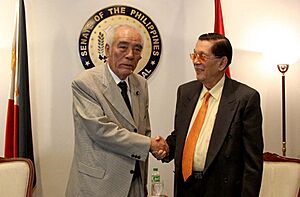
Enrile was re-elected to a fourth term in the 2010 Senate election. On July 26, 2010, he was re-elected President of the Senate. He promised to lead with honor and fairness. He also urged his colleagues to uphold the Senate's independence.
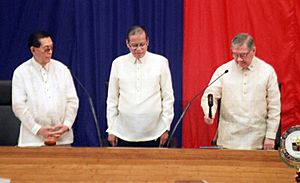
Amidst various discussions and questions about how certain funds were managed, Enrile stepped down as Senate President. This happened after his speech on June 5, 2013.
Later Years in Public Service
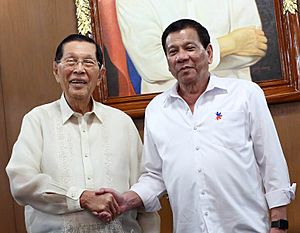
Enrile left politics after his Senate term ended in 2016. He tried to make a comeback in the 2019 elections but was not successful.
Returning to Government
In 2022, he officially returned to government. He became the Chief Presidential Legal Counsel for President Bongbong Marcos. He supported Marcos in that year's presidential election. At the age of 101, he was the oldest serving member of the Marcos administration.
Personal Life and Legacy
Family and Nickname
Enrile was often called "Manong Johnny." Manong is an Ilocano term of endearment for an older brother. He was married to Cristina Castañer García. They had two children: Juan Jr. (Jack) and Katrina. Juan Jr. was a former congressman. Katrina is the CEO of Enrile's company, Jaka Group. This company owns Philippine Match Company and Delimondo. Enrile also had a half-sister, Armida Siguion-Reyna, who was a singer and actress.
Reaching 100 Years Old
On February 14, 2024, he turned 100 years old. He celebrated this milestone at Malacañang Palace. President Bongbong Marcos said Enrile had "attained the status of an icon." The Philippine Postal Corporation issued a special stamp to honor his 100th birthday. This was done under the Centenarian Act of 2016. Enrile believed his long life was due to eating leafy vegetables and exercising.
Health and Passing
Enrile experienced health challenges, including high blood pressure. At one point, he received medical attention while facing legal proceedings. He also suffered from pneumonia in 2015. On November 11, 2025, he was reported to be in intensive care due to pneumonia. He passed away at his home with his loved ones on November 13, 2025, at 4:21 P.M., at the age of 101.
Portrayals in Media
Enrile was portrayed by Joonee Gamboa in the 1988 TV drama film A Dangerous Life. He was also portrayed by Bugoy Cariño and Enrique Gil in a two-part special. This special was part of the television drama series Maalaala Mo Kaya. The first part, aired on April 27, 2013, was titled Sapatos (lit.transl. Shoes). The second part, aired on May 4, 2013, was titled Diploma.
See also
 In Spanish: Juan Ponce-Enrile para niños
In Spanish: Juan Ponce-Enrile para niños
 | Shirley Ann Jackson |
 | Garett Morgan |
 | J. Ernest Wilkins Jr. |
 | Elijah McCoy |


